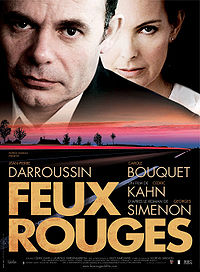
FEUX ROUGES (RED LIGHTS)
France, 2004, 105 minutes, Colour.
Jean Pierre Darroussin, Carole Bouquet, Vincent Deniard.
Directed by Cedric Kahn.
Feux Rouges is based on a novel by Georges Simenon. The original setting was America but it has been transferred back to Simenon’s native France.
The film is a drama rather than a crime and investigation story, the type of story audiences are familiar with from Simenon. This story is rather more straightforward. A married couple drive to Bordeaux to pick up their children from summer camp. The tensions between them emerge during the trip and the wife decides to travel by train. The husband continues by car. Accidents (from the same criminal) befall each of them. The husband picks up the escaped criminal, is confronted by him, eventually kills him. The wife is attacked on the train and is robbed. Much of the central part of the film consists of the anguished phone calls from the husband to try to locate his wife. There is a scene in the hospital which leads to some kind of reconciliation.
The film is very French in its atmosphere, the focus on characters, interactions. Jean Pierre Darroussin has won many awards and is completely convincing as the middle-aged husband with an alcohol problem and antagonism towards his wife and children. Carole Bouquet brings her stylish presence to the role of the wife.
1.An interesting drama? From Georges Simenon? Not an expected crime thriller and investigation? Psychological drama?
2.The settings in the French cities, towns, the countryside? The musical score?
3.The title, the reference to the police and criminals, their pursuit, the red lights of pursuing vehicles?
4.The focus on Antoine, at his office, ending the day at work, the phone calls to his wife, the appointment, her being late, his continued calling? His drinking? The planned journey, his arrival home, the preparation, going out? The later revelation that he was drinking? On the road, the tensions about shortcuts, traffic, the map? His irritation with his wife? Stopping to drink again? Her leaving a note, going by train? His continued journey, another drink, the encounter with the man on the run? His agreeing to take him? Their discussions, the puncture, the changing of the wheel? Antoine being attacked physically by the man? The stop by the side of the road, Antoine getting the bottle, breaking it? Pretending to be prostrate, his attack on the man with the bottle? With the stone? Killing him? The brutality of his anger? His dream and imagining the man still alive?
5.Antoine and his search for his wife, the phone calls, the kindliness of the woman at the restaurant? The hospital, the trains, the buses …? Growing anxiety, finally discovering where his wife was? Going to see her?
6.The character of Helene, her keeping her husband waiting, her work as a lawyer? The tension between the two, the preparation for the trip? Her accusing him of drinking, her offering to drive? Her final exasperation, leaving the note? The story of the attack, in the hospital, her feeling ashamed?
7.The discussions in the hospital, the presence of the policeman – and his speculation about the death of the man on the run?
8.Antoine, telling Helene the truth about his drinking? But not the truth about the encounter with the man?
9.The finale, the reconciliation, going to get their children? The role of the accident, the synchronicity of the same criminal (and Antoine finding the necklace in the back of the car)? The future – secure or not?